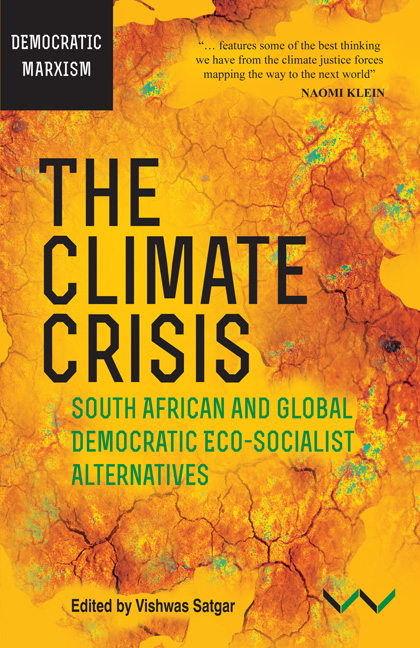Book contents
- Frontmatter
- Contents
- Tables and Box
- Acknowledgements
- Acronyms and Abbreviations
- Chapter 1 The Climate Crisis and Systemic Alternatives
- PART ONE THE CLIMATE CRISIS AS CAPITALIST CRISIS
- PART TWO DEMOCRATIC ECO-SOCIALIST ALTERNATIVES IN THE WORLD
- PART THREE DEMOCRATIC ECO-SOCIALIST ALTERNATIVES IN SOUTH AFRICA
- Chapter 10 The Climate Crisis and a ‘Just Transition’ in South Africa: An Eco-Feminist-Socialist Perspective
- Chapter 11 Energy, Labour and Democracy in South Africa
- Chapter 12 Capital, Climate and the Politics of Nuclear Procurement in South Africa
- Chapter 13 Climate Jobs at Two Minutes to Midnight
- Chapter 14 Deepening the Just Transition through Food Sovereignty and the Solidarity Economy
- Chapter 15 Eco-Capitalist Crises in the ‘Blue Economy’: Operation Phakisa's Small, Slow Failures
- CONCLUSION
- Contributors
- Index
Chapter 15 - Eco-Capitalist Crises in the ‘Blue Economy’: Operation Phakisa's Small, Slow Failures
from PART THREE - DEMOCRATIC ECO-SOCIALIST ALTERNATIVES IN SOUTH AFRICA
Published online by Cambridge University Press: 05 June 2019
- Frontmatter
- Contents
- Tables and Box
- Acknowledgements
- Acronyms and Abbreviations
- Chapter 1 The Climate Crisis and Systemic Alternatives
- PART ONE THE CLIMATE CRISIS AS CAPITALIST CRISIS
- PART TWO DEMOCRATIC ECO-SOCIALIST ALTERNATIVES IN THE WORLD
- PART THREE DEMOCRATIC ECO-SOCIALIST ALTERNATIVES IN SOUTH AFRICA
- Chapter 10 The Climate Crisis and a ‘Just Transition’ in South Africa: An Eco-Feminist-Socialist Perspective
- Chapter 11 Energy, Labour and Democracy in South Africa
- Chapter 12 Capital, Climate and the Politics of Nuclear Procurement in South Africa
- Chapter 13 Climate Jobs at Two Minutes to Midnight
- Chapter 14 Deepening the Just Transition through Food Sovereignty and the Solidarity Economy
- Chapter 15 Eco-Capitalist Crises in the ‘Blue Economy’: Operation Phakisa's Small, Slow Failures
- CONCLUSION
- Contributors
- Index
Summary
The mid-2014 South African introduction of the ‘big fast results’ methodology behind Operation Phakisa (‘hurry up’ in Sesotho) – applied in the first instance to the ocean's ‘blue economy’ – followed President Jacob Zuma's 2013 visit to Malaysia, whose leaders applied the strategy to economic policy. The nomenclature, process and strategy reflected the increasing desperation and quickening of what might be considered an ‘extractivist’ metabolism (Martinez-Alier 2002) between global capital, local ruling classes, society and nature (Terreblanche 2017).
Though Zuma's (2014) stated objectives of ‘growing’ ocean-related economic activities – especially shipping, boat construction and offshore oil and gas exploration – are running afoul of global economics, the conversion of nature into capital and attempts at ‘deriving value’ – as Zuma (2014) put it – from ecosystem services are increasingly common internationally. But the Phakisa rush follows a period of upsurging fusions between what Jacklyn Cock (2004) calls ‘red, brown and green’ resistance movements, including mineworkers, fisherfolk, farmers, feminists and climate activists, to name a few of the more prominent, some of which aim to introduce strategies associated with ‘just transition’ philosophy.
Regardless of the capacity of bottom-up resistance, Phakisa soon appeared to be on the verge of failing due to the trajectory of crashing commodity prices from above, as China's growth slows and as the global North's financial speculators moved from one bubble to the next. Shipping, mining, smelting and petroleum industry firms were demolished in the world's main stock markets during 2015. Either this stage of world capitalist crisis would require from South Africa's elites a more intense extraction of the country's resource base, or an entirely new trajectory, aimed at accumulation via routes other than what Ben Fine and Zavareh Rustomjee (1996) termed the ‘minerals–energy complex’ (MEC).
Recall the exhortation from leading business publisher Peter Bruce to ‘please, mine more and faster and ship what we mine cheaper and faster’. Economic policy makers soon moved to the very depths of their terrain: the 3.5 kilometre deep trenches below the treacherous Agulhas Current offshore of Durban.
- Type
- Chapter
- Information
- Climate Crisis, TheSouth African and Global Democratic Eco-Socialist Alternatives, pp. 314 - 337Publisher: Wits University PressPrint publication year: 2018

